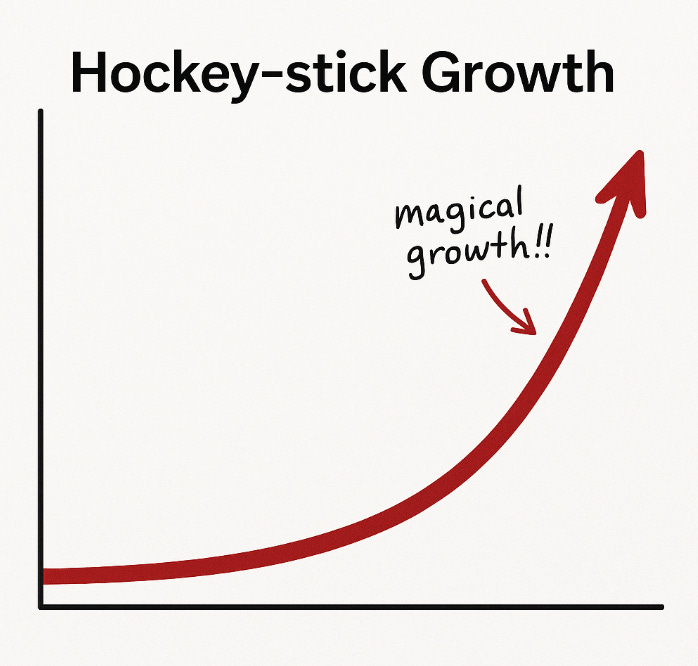Welcome to Black Sheep, a spin-off publication of my serialized memoir. SMIRK. While SMIRK was a deep dive into my unusual personal and professional relationship with one unique white-collar fraudster— Martin Shkreli — Black Sheep takes a broader view and tells the stories of a wider range of business crimes and failures.
This publication will examine cultural themes and motives that contribute to lying, cheating, stealing, and related self-inflicted disasters; the impacts of those events; and the people who play starring roles in these dramas. I find these tales both cautionary and fascinating; I hope you will, too.
If you’re looking for SMIRK, you can find the full table of contents and links to all the posts in chronological order here. Paid subscribers can access all the posts; free subscribers can access select posts. Thanks for reading!
Business Genius Barometer?
I realize it was shocking when someone like me — a nerdy, fact-driven, experienced journalist — publicly admitted to falling in love with Martin Shkreli years ago. But consider this: So did Forbes.
The same publication that bills itself as a barometer of business genius named him to its exalted “30 Under 30” list in December 2012. It called him an “activist hedge fund manager specializing in healthcare stocks” who also “founded a biotech focused on rare diseases.” It turned out those ambitions were backed largely by Martin’s outsized bravado, a handful of wealthy investors he had beguiled, and a complex game of robbing Peters to pay Pauls. He spent several years in prison.
Martin, of course, is just one example of a Forbes-anointed wunderkind who ended up in disgrace or convicted of crimes. The magazine has acknowledged a “30 Under 30” Hall of Shame, which also included FTX founder Sam Bankman-Fried, his co-defendant and ex-girlfriend Caroline Ellison, AI education startup founder Joanna Smith-Griffin, real estate fraudster Nate Paul, and the founder of failed mobile payments startup, Lucas Duplan. Now-incarcerated young Theranos founder Elizabeth Holmes wasn’t officially a “30 Under 30” honoree, but she graced Forbes’ cover and featured at its Under 30 Summit, so she arguably belongs in that group, too.

And now, Charlie Javice has joined this ignominious club. Once hailed for creating Frank, a college-aid startup JP Morgan purchased for $175 million, she has now been sentenced to 7 years in prison for fabricating its main selling point: explosive growth. Frank claimed to have more than 5 million users when JP Morgan bought it in 2021. The reality was closer to 300,000.
Apart from embarrassing the bank, Javice revived the perennial online wisecracks about Forbes’s “30 Under 30” serving as a cheat sheet for future true-crime documentaries. But the memes and the snark belie a deeper, toxic mythology. The media merely mirrors what our society and investor class idolize: youth, effortless genius, and flashy, frictionless growth. The folly of Forbes is that the magazine reflects, amplifies, and even celebrates a system that rewards storytelling over substance and fixates on the same delusions that make some frauds and failures inevitable.
To pass the bank’s due diligence, Javice hired a data scientist to generate millions of realistic-looking profiles for student aid applicants. JPMorgan discovered the deception only after the acquisition, when it sent a marketing email blast to Frank’s supposed 4 million users and saw that only a tiny fraction were deliverable. Javice was convicted in March 2025 of wire, bank, and securities fraud, along with conspiracy.
But Javice’s individual story matters less than what it reveals about the system that elevated her in the first place.
True, catastrophic frauds and blow-ups represent a small (though disproportionately visible) portion of the thousands of Forbes honorees. It’s also true that a fair percentage of paradigm-shifting Silicon Valley mega-hits (i.e. Facebook, Microsoft, and Apple) were founded by a certain type of young, brash, rule-bending hotshot. However, the cultural obsession with young, rapidly rising superstars creates unnecessary pressure that pushes some toward ethical shortcuts. We’ve taken a handful of wild edge cases and recrafted them into baseline expectations, creating a generation of founders who feel they must achieve similar trajectories or risk being cast as permanent failures.
While Forbes reflects these broader cultural values, it also actively shapes them. Being named to the “30 Under 30” opens doors to funding, partnerships, and media attention that wouldn’t otherwise exist. Intentionally or not, the list gives selected founders a stamp of legitimacy that can paper over red flags investors might otherwise notice.
Though Javice defrauded a bank rather than VCs, she was elevated by the same cultural forces that produced Bankman-Fried, Holmes, and the rest. Understanding those forces, including the biases, preferences, and pressure points of the startup ecosystem, might help explain why so many of our supposed best and brightest end up cheating, stealing, or committing epic errors of judgment.
The Tropes Of Startup Magical Realism
Granted, I’m just a journalist who mostly covers legal cases. I’m not a founder or a venture capitalist, and I’ve barely set foot in Silicon Valley. But I’ve seen the messy aftermath of plenty of startups going sideways, including blame games, broken trust, and long-simmering tensions suddenly exploding. From my vantage point, I think I can assemble a roughly accurate picture of some of the psychological underpinnings of the ecosystem.
Namely, investing is often compared with gambling. If buying stocks is a bit like playing blackjack (skill matters, but luck still decides the hand) then venture investing is closer to buying lottery tickets in bulk. The odds of winning are infinitesimally small, but the potential payout is so insanely alluring that no one can resist believing they might hold the winning numbers. And unlike actual lotteries, when these bets fail, the collateral damage extends far beyond the gamblers, to employees suddenly laid off, customers left holding worthless products, and markets that lose faith in innovative products.
Sure, VCs and acquirers of early-stage businesses examine financial metrics and construct elaborate rationales to give their decisions a veneer of logic. But at the end of the day, there are too many unknowns to rely purely on data. When placing bets on startups, emotion inevitably creeps in. Symbols, totems, and tea leaves end up doing as much work as spreadsheets, even for the most analytical investors.
These superstitions aren’t lucky socks or crystals (I assume). They’re qualitative or quantitative factors (real or imagined) that supposedly indicate a company is on the verge of exponential growth. To believers, these signals promise a return on investment at the very least, and at best, the next “Uber” or “Airbnb.” For those who guess right and hit it big, the rewards include not just fabulous wealth but the sort of legendary status that guarantees speaking gigs, seed funds, and podcasts for the rest of their natural lives.
Some examples of the supposedly predictive patterns and symbols VCs seek out:
Hockey-stick charts
Common sense and philosophical wisdom tell us that success takes a variety of forms; that the proverbial tortoise can beat the hare; and that there are many paths up a mountain. These are not the messages that win over the investor community, however. Investors want to see revenue or user figures moving in exactly one direction: up. The steeper and sharper the curve, the better.
Investors accept that it might take some time for the Next Big Thing to catch on, and that growth could be flat for a period of years before an inflection point occurs (such as with Amazon, in particular). But once that happens, there should be no turning back, or so the model of Past Big Things tells them. Expecting every promising tech startup to replicate those rare alignments of timing, product, and market is more than a little absurd.
Founder protagonists
Even the most measured, critical thinkers among us can be seduced by a compelling narrative. Investors, being only human, want to fund a story, not just a product or a business. And every great story needs a main character. For investors, that’s the founder/CEO.
But the traits that make for a captivating startup protagonist aren’t the same ones that drive sustainable success. The heroes of startup mythology are usually young, brash, whip-smart, eccentric risk-takers: the Ivy League dropouts, the twenty-somethings who grind nonstop and sleep under their desks, and the mavericks who “move fast and break things” no matter what chaos they cause.
Building a lasting company does require boldness and self-assurance, but it also takes humility, discipline, ethical grounding, and the ability to manage people and plan for the long term. Those virtues don’t sparkle in a pitch deck, and they rarely earn anyone a Forbes write-up.
Mystical milestones
Serious investors scoff at psychics, mystics, and numerology, yet they readily put their faith in the predictive power of semi-arbitrary financial milestones. Startup lore goes like this: the first hurdle is $1 million in annual recurring revenue (ARR), then $5 million, then $10 million, and so on. Each round number is a rite of passage, opening doors to more funding. However, the difference between $990,000 and $1 million is almost entirely psychological.
Reality and markets are messy, governed by countless variables beyond our control. But like palm readings or tarot cards, the mythology of the numbers holds power because they offer an illusion of certainty, and a way to impose order on the unknowable. The path from $1 million to $5 million to $10 million looks smooth, inevitable, and deeply reassuring on a PowerPoint slide.
Blitzscaling as a virtue
To most bootstrap founders (indeed, to most humans), spending money you don’t have and expanding a business well beyond its means is simply bonkers. But in the startup funding world, “blitzscaling” is proof of belief in your own destiny. Under that mindset, actions that would ordinarily be considered borderline sociopathic are reframed as courageous and visionary.
The logic is simple and circular: if you are growing rapidly, you should be constantly at risk of running out of capital. Founders are told that if they move swiftly with enough conviction, the market, the team, and even the product will eventually catch up. Or, you may assume that you’re in a “winner take all” situation, and whoever dominates the market will be a trillionaire (see the current AI race). Sometimes this works spectacularly well (see: Amazon), but often flirting with disaster does end in actual disaster: namely, wasted resources, unpaid debts, and people who are suddenly laid off and unable to support themselves or their families. But who’s to say you can’t try again and fail upward?
Disruption as a purpose
Who remembers Juicero? I’m sure the venture capital industry would prefer if you didn’t. In the mid-2010s, Juicero sold $400 WiFi-connected juicers that promised fresh, effortless juice at the touch of a button. The catch was that Juicero’s juice came from pre-packaged produce pouches, not whole fruits or vegetables, and those packets could be squeezed just as effectively by hand.
Despite the absurdity, Juicero raised an astonishing $120 million from investors, including Kleiner Perkins and Google’s venture arm, by pitching itself as a “disruptor” to the juice industry. But the product solved no real problem, offering no meaningful convenience or innovation, just an expensive, over-engineered machine. The business simply shut down in 2017, with no way to move forward, leaving investors nothing to show for their contributions.
Exceptions vs. Rules
Do these patterns sometimes correlate with success? Absolutely. Facebook did experience hockey-stick growth. Amazon did blitzscale and disrupt. Uber and Airbnb disrupted. The problem isn’t that these patterns never work—it’s that they work so rarely that treating them as reliable indicators is dangerous. For every Amazon, there are thousands of Juiceros. The venture capital model can absorb these losses because one massive win overcomes all the failures. But celebrating this dynamic culturally, on magazine covers and conference stages, creates a generation of founders who think recklessness is a necessary ingredient of success.
Notably, as Juicero shows, not all bad bets and manifestations of magical thinking lead to outright fraud. But both outrageously bad ideas that nonetheless raise millions of dollars in funding and “fake it till you make it” schemes have common roots: a culture that values storytelling over substance, that rewards bold claims more than verified results, and that treats due diligence as an obstacle to overcome rather than a safeguard to embrace.
Youth vs. Experience
Youth does have important advantages in the startup game, especially if the business is at the leading edge of a new, innovative industry. Young founders typically bring energy, dedication, unconventional ideas, and an appetite for risk.
But take a super-ambitious twenty-something founder, fresh out of school or freshly dropped out, and hand them a roadmap filled with milestones, metrics, and must-haves that everyone insists are essential for success. They won’t just aim to hit those targets; they’ll want to crush them. Young founders are competitive by nature, and when the spotlight shines brighter (say, after landing on a “30 Under 30” list), the pressure to win at any cost intensifies. When those goals are unrealistic or modeled on rare, lottery-style success stories, the temptation to “fudge” the data or other markers of success gets stronger.
Experience is the best antidote to that pressure, and it is the one thing every prodigy lacks. Seasoned operators know when the ground is solid beneath them, when a smooth-talking investor is speaking in empty platitudes, and when the numbers don’t make sense, no matter how you spin them. On an aggregate basis, older founders perform better than young founders, as shown clearly in research, not because they’re smarter but because they know how to brace themselves for what can go wrong.
The Real Folly Of Forbes
It’s easy to dunk on Forbes, and to some extent, the magazine has earned the ridicule. The “30 Under 30 “franchise is a self-congratulatory, credulous feedback loop between elite media and elite investors. It has been a popular feature, though, bringing desperately needed eyeballs, ad revenue, and sponsorship to the magazine as traditional readership falls. (Note: It is NOT pay-to-play, but there are lots of other ancillary economic benefits for the magazine.) Given the incentives, the “30 Under 30” section has ballooned: more categories, more honorees, more conferences. “Thirty” now means several hundred each year, and with that scale comes statistical certainty: more stars, but also more scandals.
Still, Forbes continues to hold enormous cultural sway, the kind that could be used to change the conversation. Imagine if the magazine treated caution and proven track records as virtues that were even more important than speed and spectacle. It could celebrate founders who build slowly, profitably, and ethically, who measure success in years, not funding rounds — and stop venerating founders based mostly on their youth, but on other, more meaningful metrics? That shift would require swimming against the hype, but who better to lead it than the publication that helped define what ambition looks like in the first place?










